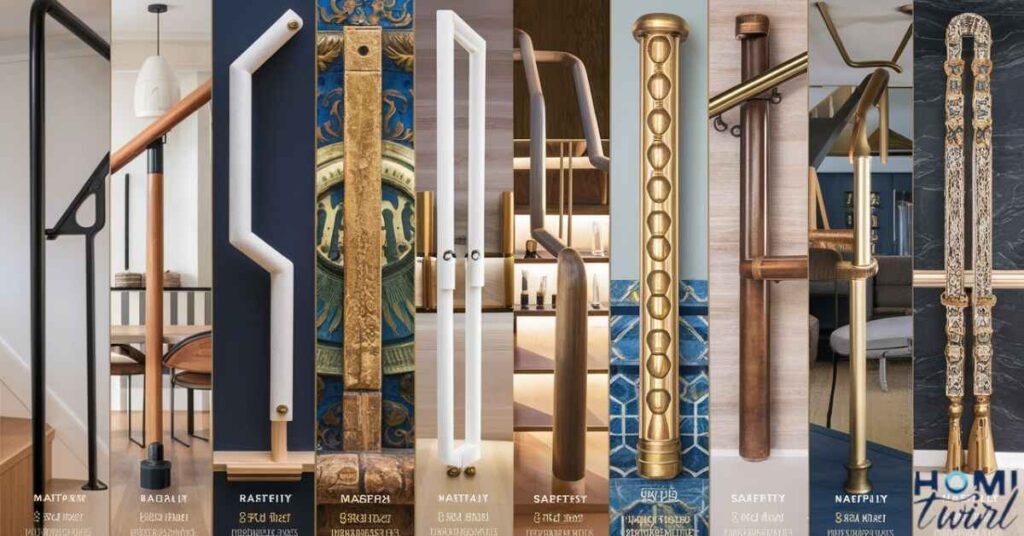Handrails come in many types, each offering safety and a unique style for your stairs.
Wooden handrails, like oak and cherry, bring warmth and durability. Metal handrails, such as aluminum and steel, offer strength and a modern look. Glass handrails create a sleek, open feel with options like clear or tinted glass. Cable handrails provide a minimalist design and secure grip.
Each type is designed to prevent accidents and enhance the beauty of your home, ensuring safety and style go hand in hand.
Why Your Stairway Needs a Handrail: More Than Just a Pretty Fixture
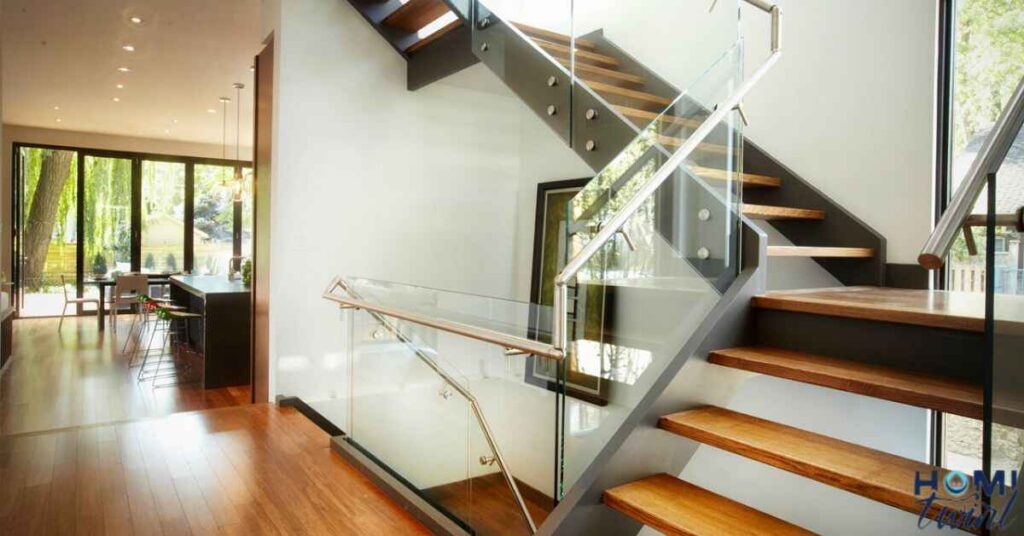
The Hidden Dangers of Stair-Related Accidents
Did you know that stairway accidents are one of the leading causes of injuries in homes? It’s a sobering thought, isn’t it? Each year, thousands of people in the USA and UK find themselves taking an unexpected tumble down the stairs. These accidents can range from minor bruises to severe injuries, and in some cases, they can even be fatal.
Read This Blog: UPGRADING HOME ELECTRICAL – WHAT YOU NEED TO KNOW
“According to the National Safety Council, falls are the third leading cause of unintentional injury-related deaths in the United States.”
How Handrails Can Save the Day (and Your Bones)
This is where handrails come into play. They’re not just there to look pretty – they’re your trusty sidekick in the battle against gravity. A well-designed handrail provides.
- Stability while ascending or descending stairs
- Support for those with mobility issues
- A quick grab point if you lose your balance
- Guidance in low-light conditions
What the Law Says: Building Codes for Handrails in the USA and UK
Both the USA and UK take stair safety seriously, with strict building codes in place for handrails. Here’s a quick comparison.
| Feature | USA (International Residential Code) | UK (Building Regulations) |
| Height | 34-38 inches (864-965 mm) | 900-1000 mm |
| Grip Size | 1.25-2 inches (32-51 mm) diameter | 40-50 mm diameter |
| Clearance | 1.5 inches (38 mm) from wall | 50 mm from wall |
Remember, these are just general guidelines. Always check your local building codes for specific requirements.
Wooden Wonders: Classic and Timeless Handrail Options
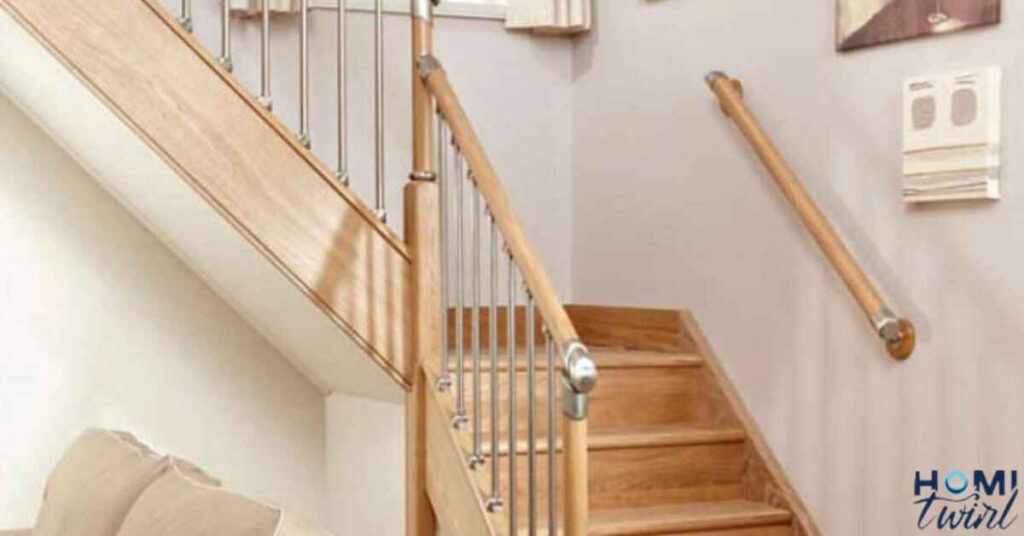
When it comes to handrail materials, wood has stood the test of time. It’s warm, inviting, and can complement a wide range of interior styles. Let’s explore some popular wood options.
Oak: The Sturdy Staple of Stairways
Oak is the heavyweight champion of wooden handrails. It’s.
- Exceptionally durable
- Resistant to wear and tear
- Available in a variety of finishes
- Ideal for both traditional and modern homes
Pro tip: Oak handrails pair beautifully with white-painted balusters for a classic look.
Maple: Light and Bright for Modern Homes
If you’re after a lighter, more contemporary feel, maple might be your go-to. Maple handrails offer.
- A smooth, fine grain
- A light color that brightens up spaces
- Excellent durability
- A modern, clean aesthetic
Cherry: Adding a Touch of Warmth and Elegance
For those who crave a touch of luxury, cherry wood handrails are hard to beat. They provide.
- A rich, warm color that deepens over time
- A smooth texture that’s pleasant to touch
- A sophisticated look that works well in upscale homes
Case study: The Johnson family in Atlanta opted for cherry handrails in their Victorian-style home renovation. The result? A stunning blend of historical charm and modern safety that increased their home’s value by 5%.
Metal Marvels: Sleek and Strong Handrail Choices
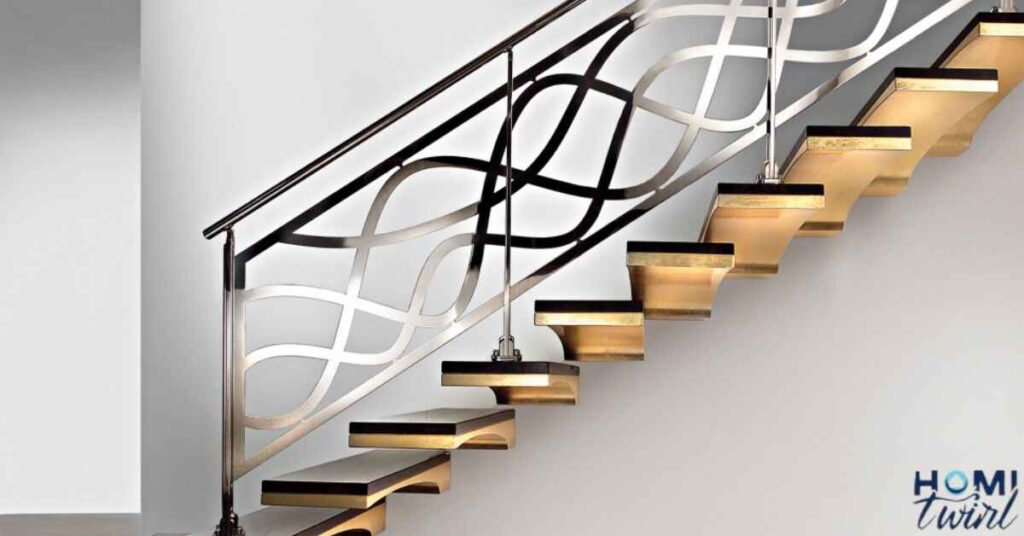
For those who prefer a more industrial or contemporary look, metal handrails offer both strength and style.
Aluminum: Lightweight Champion of Durability
Aluminum handrails are a popular choice for both indoor and outdoor use. They’re:
- Incredibly lightweight
- Resistant to rust and corrosion
- Easy to maintain
- Available in various finishes and colors
Steel: Industrial Chic for Contemporary Spaces
Steel handrails bring a bold, modern look to any stairway. They offer:
- Unmatched strength and durability
- A sleek, minimalist aesthetic
- The ability to be powder-coated in any color
- Excellent fire resistance
Wrought Iron: Bringing Old-World Charm to Your Steps
For a touch of elegance and tradition, wrought iron handrails are hard to beat. They provide:
- Intricate designs and patterns
- A timeless, classic look
- Incredible strength and longevity
- The ability to be customized to your taste
Glass Acts: Transparent Beauty in Handrail Design
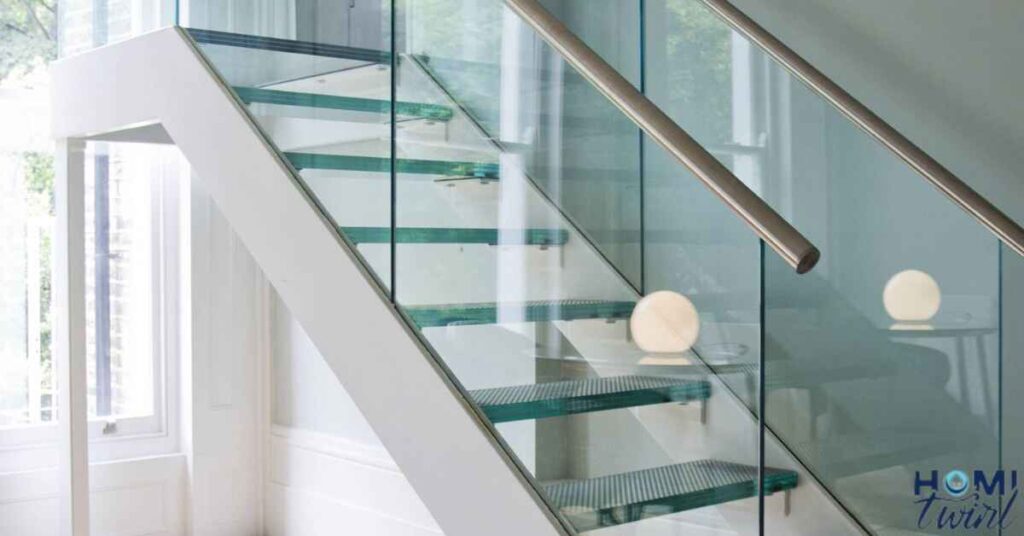
For those who want to make a statement, glass handrails offer a unique blend of safety and style.
Tempered Glass: Strength Meets Sophistication
Tempered glass handrails are not just beautiful – they’re tough too. They offer:
- Incredible strength (4-5 times stronger than regular glass)
- Safety (breaks into small, less dangerous pieces if shattered)
- A modern, open feel
- The illusion of more space in your stairway
Laminated Glass: Safety in Layers
Laminated glass takes safety a step further. It consists of:
- Two or more layers of glass
- A plastic interlayer that holds the glass together if broken
- Additional sound insulation properties
- UV protection for your home’s interior
Frosted and Tinted Options: Adding a Pop of Color and Privacy
Want the elegance of glass with a touch more privacy? Consider frosted or tinted glass handrails. They provide:
- A range of color options to match your decor
- Increased privacy without sacrificing light
- A unique, eye-catching design element
- The ability to hide fingerprints and smudges
Cable Creations: Minimalist Handrails with Maximum Impact
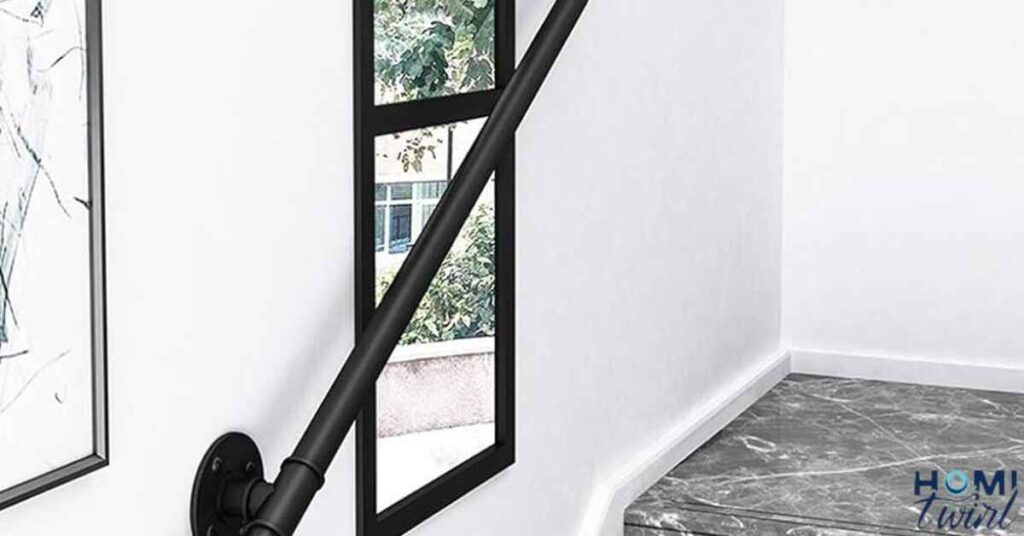
For a sleek, modern look that doesn’t obstruct your view, cable handrails are an excellent choice.
Also Read This Blog: ARE MASSAGE CHAIRS GOOD FOR YOU
Stainless Steel Cables: Sleek and Weather-Resistant
Stainless steel cable handrails offer:
- Excellent durability and weather resistance
- A clean, minimalist aesthetic
- The ability to span long distances without sagging
- Low maintenance requirements
Aluminum Cables: The Lightweight Alternative
If you’re looking for a lighter option, aluminum cables provide:
- Similar strength to steel at a lower weight
- Excellent corrosion resistance
- A variety of finish options
- Easy installation
Tension and Support: Understanding Cable Handrail Systems
Cable handrail systems consist of:
- Vertical posts (usually metal)
- Horizontal cables running between posts
- Tensioners to keep cables taut
- A top rail for gripping and support
Safety note: Always ensure cable spacing meets local building codes to prevent children from squeezing through or getting stuck.
Mix and Match: Hybrid Handrails for Unique Styles
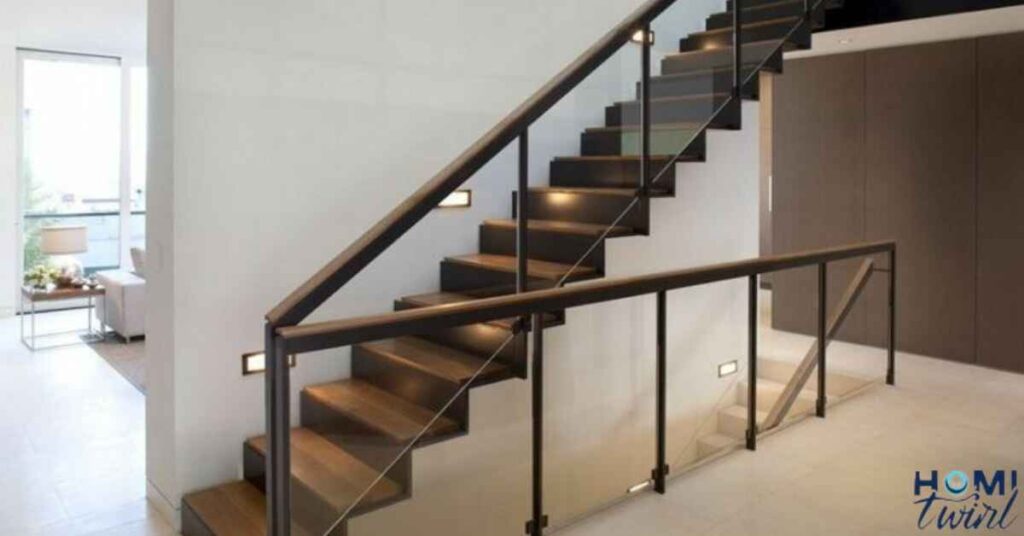
Who says you have to stick to one material? Hybrid handrails offer the best of both worlds.
Wood and Metal Combos: The Best of Both Worlds
Combining wood and metal can create a stunning effect. Consider:
- A wooden top rail with metal balusters
- Metal brackets supporting a wooden handrail
- Wood posts with metal cable infills
Glass and Cable Fusions: Open Concept Stairways
For an ultra-modern look, try combining glass and cable:
- Glass panels as the main barrier
- Thin cable railings for added safety
- A metal top rail for a finished look
Custom Creations: Tailoring Handrails to Your Taste
The sky’s the limit when it comes to custom handrails. Some unique ideas include:
- Incorporating LED lighting into the handrail design
- Using reclaimed materials for an eco-friendly touch
- Adding artistic elements like carved designs or inlays
Finishing Touches: Materials and Textures That Make a Difference
The finish of your handrail can dramatically impact its look and feel.
Wood Finishes: From Natural Grains to Painted Perfection
Wood handrails can be finished in various ways:
- Clear coat to showcase the natural grain
- Stained to match other wood elements in your home
- Painted for a pop of color or to match your walls
Metal Magic: Brushed, Polished, or Powder-Coated?
Metal handrails offer a range of finish options:
- Brushed for a subtle, matte look
- Polished for a mirror-like shine
- Powder-coated in any color for durability and style
Glass Glamour: Clear, Frosted, or Colorful?
Glass handrails can be customized with:
- Clear glass for an unobstructed view
- Frosted glass for privacy
- Tinted glass to complement your color scheme
Safety First: Installing Your Handrail the Right Way
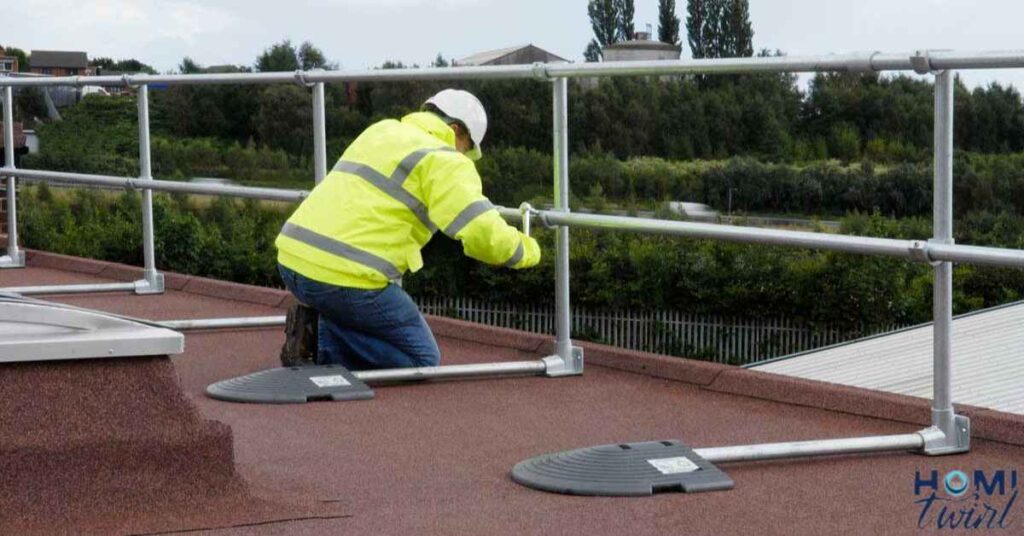
Proper installation is crucial for both safety and longevity of your handrail.
Height Matters: Getting the Measurements Just Right
The ideal handrail height is:
- 34-38 inches (864-965 mm) in the USA
- 900-1000 mm in the UK
Measure from the nose of the stair tread to the top of the handrail.
Grip and Comfort: Ensuring Easy Use for All Ages
A good handrail should be:
- Easy to grasp (1.25-2 inches or 32-51 mm in diameter)
- Smooth with no sharp edges
- Continuous along the entire flight of stairs
Secure Attachments: No Wobbles Allowed
Handrails must be securely attached to:
- Wall studs (for wall-mounted rails)
- Sturdy posts (for freestanding rails)
- Support at least 200 pounds of force
Pro tip: Use a stud finder to locate wall studs for secure mounting.
Keeping It Clean: Maintenance Tips for Long-Lasting Handrails
Regular maintenance will keep your handrails looking great and functioning safely.
Wood Care: Protecting Your Investment
To maintain wooden handrails:
- Dust regularly with a soft cloth
- Clean with a damp cloth and mild soap as needed
- Apply wood polish or oil periodically to protect the finish
Metal Upkeep: Shine On, You Crazy Diamond
For metal handrails:
- Wipe down with a soft cloth regularly
- Use a mild detergent for tougher grime
- Apply a metal polish for extra shine
Glass Maintenance: Crystal Clear and Streak-Free
Keep glass handrails sparkling by:
- Using a glass cleaner and microfiber cloth
- Avoiding abrasive cleaners that can scratch the surface
- Cleaning spills immediately to prevent staining
When Good Handrails Go Bad: Repair and Replacement Guide
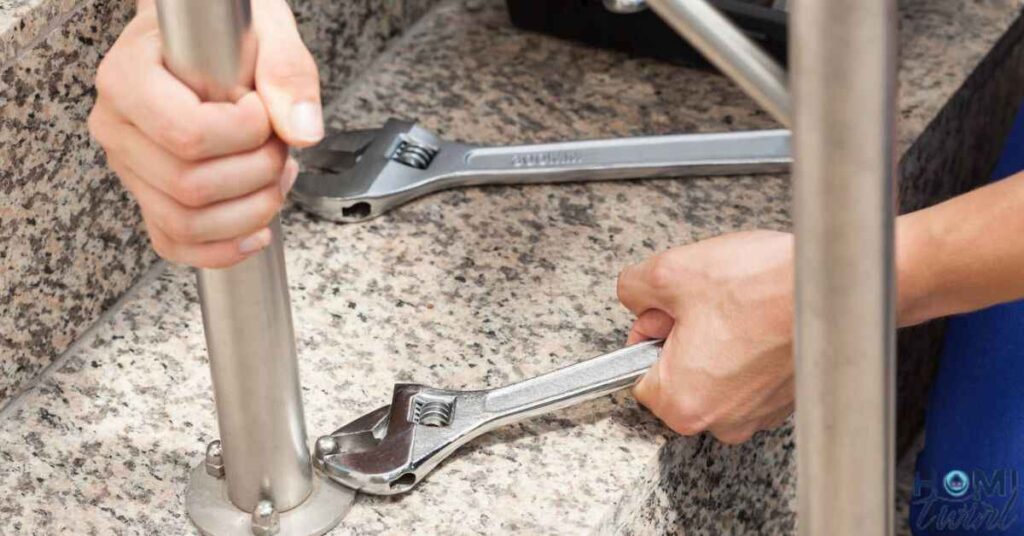
Even the best handrails may need repair or replacement over time.
Signs It’s Time for a Handrail Makeover
Look out for:
- Loose or wobbly sections
- Splintered or cracked wood
- Rusted or corroded metal
- Chipped or cracked glass
DIY Fixes vs. Professional Repairs: What You Need to Know
Some repairs, like tightening screws or touching up paint, can be DIY projects. However, for structural issues or complex repairs, it’s best to call in a professional.
Out with the Old, In with the New: Upgrading Your Handrail
Consider upgrading your handrail if:
- It no longer meets current safety standards
- You’re renovating your home
- You want to update your home’s style
Wrapping It Up: Choosing the Perfect Handrail for Your Home
Selecting the right handrail is a balance of safety, style, and practicality.
Balancing Form and Function: Key Takeaways
Remember:
- Safety should always be your top priority
- Choose a style that complements your home’s decor
- Consider maintenance requirements when selecting materials
Future Trends in Handrail Design: What’s on the Horizon?
Keep an eye out for:
- Smart handrails with built-in lighting and sensors
- Eco-friendly materials like bamboo or recycled plastics
- 3D-printed custom designs for unique looks
Your Next Steps: From Inspiration to Installation
Ready to upgrade your handrails? Here’s what to do:
- Assess your needs (safety, style, budget)
- Research local building codes
- Explore different materials and designs
- Get quotes from reputable installers
- Make your selection and enjoy your new, safe, and stylish stairs!
Remember, a well-chosen handrail not only keeps you safe but also adds value and beauty to your home. So go ahead, grab life by the handrail, and step up your stairway game.
The Psychology of Stairway Safety: How Handrails Affect Our Behavior
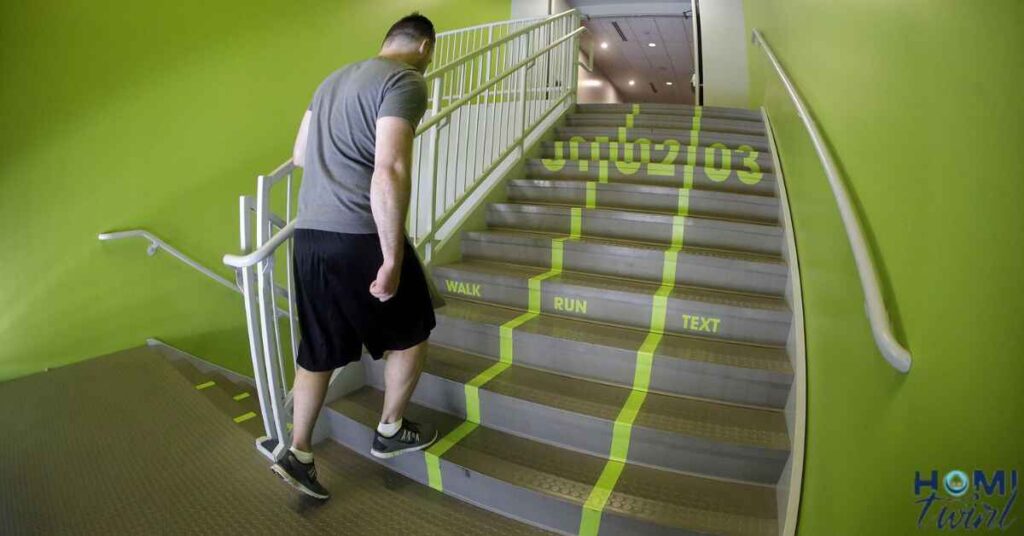
Ever wonder why you instinctively reach for a handrail? It’s not just about physical support – there’s a psychological aspect too.
The Comfort of Contact: Why We Love to Hold On
Studies show that people feel more secure when they have tactile contact with their environment. A handrail provides:
- A sense of stability
- Psychological reassurance
- A guide in unfamiliar spaces
Color Psychology in Handrail Design
Believe it or not, the color of your handrail can affect how people use it:
- Bold colors draw attention, encouraging use
- Neutral tones blend in, ideal for minimalist designs
- Contrasting colors help those with visual impairments
“The right handrail color can increase usage by up to 30%, significantly improving stairway safety.” – Dr. Sarah Johnson, Environmental Psychologist
Handrails Around the World: A Cultural Perspective
Different cultures have unique approaches to handrail design and use.
Japanese Minimalism: Less is More
In Japan, you’ll often find:
- Sleek, unobtrusive designs
- Natural materials like bamboo
- Integration with overall architectural aesthetics
European Grandeur: Staircases as Art
Many European countries treat staircases (and their handrails) as works of art:
- Ornate wrought iron designs in France
- Intricate wood carvings in Germany
- Marble and brass combinations in Italy
American Pragmatism: Function Meets Form
In the US, you’ll typically see:
- A focus on safety and accessibility
- A blend of traditional and modern designs
- Compliance with ADA (Americans with Disabilities Act) standards
The Green Side of Handrails: Eco-Friendly Options
As sustainability becomes increasingly important, eco-friendly handrail options are on the rise.
Reclaimed Wood: Beauty with a History
Using reclaimed wood for handrails offers:
- A unique, weathered look
- Reduced environmental impact
- Each piece tells a story
Bamboo: The Sustainable Superstar
Bamboo handrails are gaining popularity due to:
- Rapid growth and renewability
- Strength comparable to hardwoods
- Natural resistance to moisture and insects
Recycled Metal: From Scrap to Chic
Handrails made from recycled metal provide:
- Industrial-chic aesthetic
- Reduced carbon footprint
- Durability and strength
Handrails in Commercial Spaces: Beyond the Home
While we’ve focused on residential applications, handrails play a crucial role in commercial and public spaces too.
Hospitals: Hygiene and Support
In healthcare settings, handrails need to be:
- Easy to clean and disinfect
- Supportive for patients with mobility issues
- Clearly visible in emergency situations
Schools: Durability Meets Safety
School handrails must withstand:
- Heavy daily use
- Potential vandalism
- Strict safety regulations
Hotels: Luxury and Functionality
In the hospitality industry, handrails often:
- Make a design statement
- Complement the overall decor
- Meet international safety standards
DIY Handrail Projects: For the Hands-On Homeowner
For those who love a good DIY challenge, creating your own handrail can be a rewarding project.
Simple Rope Handrail: Nautical Charm
Materials needed:
- Thick nautical rope
- Wall brackets
- Screws and anchors
Steps:
- Mark and drill holes for brackets
- Install wall anchors if needed
- Attach brackets to the wall
- Thread rope through brackets
- Secure rope ends with knots or decorative finials
Industrial Pipe Handrail: Urban Edge
Materials:
- Iron pipes and fittings
- Floor flanges
- Screws and anchors
Steps:
- Plan your design and measure carefully
- Cut pipes to size (or have them cut at a hardware store)
- Assemble pipes and fittings
- Attach floor flanges to the wall
- Connect your pipe assembly to the flanges
Safety note: Always ensure your DIY handrail meets local building codes and can support the required weight.
The Future of Handrails: Smart Technology Integration
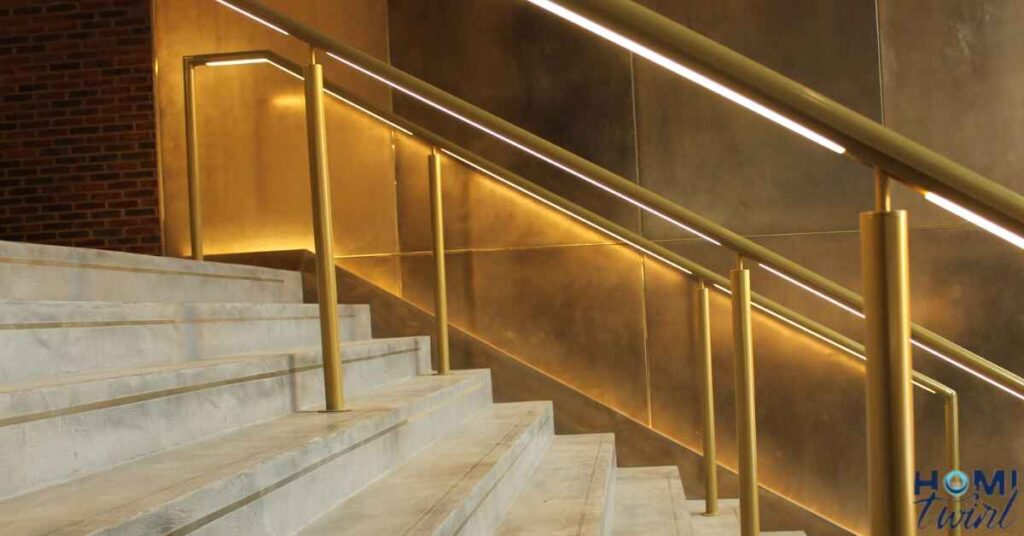
As homes become smarter, so do handrails. Here’s what we might see in the near future:
LED-Integrated Handrails
These high-tech handrails offer:
- Motion-activated lighting for nighttime safety
- Color-changing capabilities for ambiance
- Energy-efficient illumination for stairways
Sensor-Equipped Handrails
Imagine handrails that can:
- Detect falls and alert emergency services
- Monitor grip strength for early detection of health issues
- Adjust height automatically for different users
Self-Cleaning Handrails
Using advanced materials and UV technology, these handrails could:
- Kill bacteria and viruses on contact
- Reduce the need for manual cleaning
- Improve overall hygiene in high-traffic areas
Handrails and Home Value: A Surprising Connection
Did you know that well-designed handrails can actually increase your home’s value?
Safety Sells: Appealing to Buyers
Homes with safe, stylish staircases are more attractive to:
- Families with young children
- Older adults looking to age in place
- Safety-conscious buyers of all ages
Aesthetic Appeal: First Impressions Matter
A beautifully designed handrail can:
- Enhance your home’s overall look
- Create a focal point in your entryway
- Demonstrate attention to detail and quality
Return on Investment: The Numbers
According to a recent real estate survey:
- Homes with updated, safe staircases sold 15% faster
- Well-designed handrails contributed to a 5-10% increase in perceived home value
- 80% of potential buyers cited stairway safety as “very important” in their decision-making process.
Frequently Asked Question
What are the benefits of installing handrails?
Handrails provide stability and support, preventing falls and enhancing safety on stairs.
Which material is best for handrails: wood, metal, or glass?
The choice depends on your home’s style and needs. Wood offers warmth, metal provides durability, and glass creates a modern look.
Do handrails need to meet specific building codes?
Yes, building codes specify height, grip size, and installation requirements to ensure safety and compliance.
Can handrails be customized to fit unique stairway designs?
Yes, handrails can be tailored to fit various shapes and styles, blending functionality with personalized aesthetics.
How do I maintain handrails for longevity?
Regular cleaning with mild soap and water, along with periodic inspections for damage, helps maintain handrail integrity.
Are handrails necessary for all staircases?
Yes, handrails are crucial for safety, providing support for all users, especially those with mobility challenges or visual impairments.
Conclusion
Handrails are essential for both safety and enhancing the aesthetic appeal of stairways in homes. They provide crucial support, stability, and balance, reducing the risk of accidents, particularly falls. Whether crafted from wood, metal, glass, or cable, each type of handrail offers unique advantages suited to different styles and preferences.
Adhering to building codes ensures proper installation and compliance, further emphasizing their role in creating a safe environment. Regular maintenance and careful consideration of design elements can significantly impact both the functionality and visual appeal of handrails.
By prioritizing safety through well-chosen handrails and integrating them seamlessly into your home’s design, you not only protect inhabitants but also elevate the overall look and feel of your living space.

